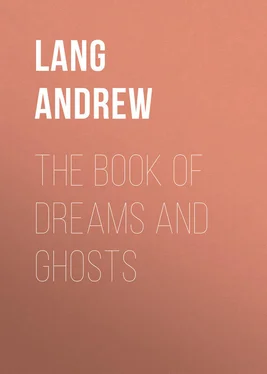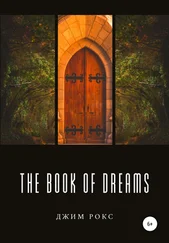Andrew Lang - The Book of Dreams and Ghosts
Здесь есть возможность читать онлайн «Andrew Lang - The Book of Dreams and Ghosts» — ознакомительный отрывок электронной книги совершенно бесплатно, а после прочтения отрывка купить полную версию. В некоторых случаях можно слушать аудио, скачать через торрент в формате fb2 и присутствует краткое содержание. Жанр: foreign_antique, foreign_prose, на английском языке. Описание произведения, (предисловие) а так же отзывы посетителей доступны на портале библиотеки ЛибКат.
- Название:The Book of Dreams and Ghosts
- Автор:
- Жанр:
- Год:неизвестен
- ISBN:нет данных
- Рейтинг книги:4 / 5. Голосов: 1
-
Избранное:Добавить в избранное
- Отзывы:
-
Ваша оценка:
- 80
- 1
- 2
- 3
- 4
- 5
The Book of Dreams and Ghosts: краткое содержание, описание и аннотация
Предлагаем к чтению аннотацию, описание, краткое содержание или предисловие (зависит от того, что написал сам автор книги «The Book of Dreams and Ghosts»). Если вы не нашли необходимую информацию о книге — напишите в комментариях, мы постараемся отыскать её.
The Book of Dreams and Ghosts — читать онлайн ознакомительный отрывок
Ниже представлен текст книги, разбитый по страницам. Система сохранения места последней прочитанной страницы, позволяет с удобством читать онлайн бесплатно книгу «The Book of Dreams and Ghosts», без необходимости каждый раз заново искать на чём Вы остановились. Поставьте закладку, и сможете в любой момент перейти на страницу, на которой закончили чтение.
Интервал:
Закладка:
THE ARREARS OF TEIND
“Mr. Rutherford, of Bowland, a gentleman of landed property in the Vale of Gala, was prosecuted for a very considerable sum, the accumulated arrears of teind (or tithe) for which he was said to be indebted to a noble family, the titulars (lay impropriators of the tithes). Mr. Rutherford was strongly impressed with the belief that his father had, by a form of process peculiar to the law of Scotland, purchased these teinds from the titular, and, therefore, that the present prosecution was groundless. But, after an industrious search among his father’s papers, an investigation among the public records and a careful inquiry among all persons who had transacted law business for his father, no evidence could be recovered to support his defence. The period was now near at hand, when he conceived the loss of his law-suit to be inevitable; and he had formed the determination to ride to Edinburgh next day and make the best bargain he could in the way of compromise. He went to bed with this resolution, and, with all the circumstances of the case floating upon his mind, had a dream to the following purpose. His father, who had been many years dead, appeared to him, he thought, and asked him why he was disturbed in his mind. In dreams men are not surprised at such apparitions. Mr. Rutherford thought that he informed his father of the cause of his distress, adding that the payment of a considerable sum of money was the more unpleasant to him because he had a strong consciousness that it was not due, though he was unable to recover any evidence in support of his belief. ‘You are right, my son,’ replied the paternal shade. ‘I did acquire right to these teinds for payment of which you are now prosecuted. The papers relating to the transaction are in the hands of Mr. – , a writer (or attorney), who is now retired from professional business and resides at Inveresk, near Edinburgh. He was a person whom I employed on that occasion for a particular reason, but who never on any other occasion transacted business on my account. It is very possible,’ pursued the vision, ‘that Mr. – may have forgotten a matter which is now of a very old date; but you may call it to his recollection by this token, that when I came to pay his account there was difficulty in getting change for a Portugal piece of gold and we were forced to drink out the balance at a tavern.’
“Mr. Rutherford awoke in the morning with all the words of the vision imprinted on his mind, and thought it worth while to walk across the country to Inveresk instead of going straight to Edinburgh. When he came there he waited on the gentleman mentioned in the dream – a very old man. Without saying anything of the vision he inquired whether he ever remembered having conducted such a matter for his deceased father. The old gentleman could not at first bring the circumstance to his recollection, but on mention of the Portugal piece of gold the whole returned upon his memory. He made an immediate search for the papers and recovered them, so that Mr. Rutherford carried to Edinburgh the documents necessary to gain the cause which he was on the verge of losing.”
The story is reproduced because it is clearly one of the tales which come round in cycles, either because events repeat themselves or because people will unconsciously localise old legends in new places and assign old occurrences or fables to new persons. Thus every one has heard how Lord Westbury called a certain man in the Herald’s office “a foolish old fellow who did not even know his own foolish old business”. Lord Westbury may very well have said this, but long before his time the remark was attributed to the famous Lord Chesterfield. Lord Westbury may have quoted it from Chesterfield or hit on it by accident, or the old story may have been assigned to him. In the same way Mr. Rutherford may have had his dream or the following tale of St. Augustine’s (also cited by Scott) may have been attributed to him, with the picturesque addition about the piece of Portuguese gold. Except for the piece of Portuguese gold St. Augustine practically tells the anecdote in his De Cura pro Mortuis Habenda , adding the acute reflection which follows. 12 12 Augustine. In Library of the Fathers, XVII. Short Treatises , pp. 530-531.
“Of a surety, when we were at Milan, we heard tell of a certain person of whom was demanded payment of a debt, with production of his deceased father’s acknowledgment, which debt, unknown to the son, the father had paid, whereupon the man began to be very sorrowful, and to marvel that his father while dying did not tell him what he owed when he also made his will. Then in this exceeding anxiousness of his, his said father appeared to him in a dream, and made known to him where was the counter acknowledgment by which that acknowledgment was cancelled. Which when the young man had found and showed, he not only rebutted the wrongful claim of a false debt, but also got back his father’s note of hand, which the father had not got back when the money was paid.
“Here then the soul of a man is supposed to have had care for his son, and to have come to him in his sleep, that, teaching him what he did not know, he might relieve him of a great trouble. But about the very same time as we heard this, it chanced at Carthage that the rhetorician Eulogius, who had been my disciple in that art, being (as he himself, after our return to Africa, told us the story) in course of lecturing to his disciples on Cicero’s rhetorical books, as he looked over the portion of reading which he was to deliver on the following day, fell upon a certain passage, and not being able to understand it, was scarce able to sleep for the trouble of his mind: in which night, as he dreamed, I expounded to him that which he did not understand; nay, not I, but my likeness, while I was unconscious of the thing and far away beyond sea, it might be doing, or it might be dreaming, some other thing, and not in the least caring for his cares. In what way these things come about I know not; but in what way soever they come, why do we not believe it comes in the same way for a person in a dream to see a dead man, as it comes that he sees a living man? both, no doubt, neither knowing nor caring who dreams of their images, or where or when.
“Like dreams, moreover, are some visions of persons awake, who have had their senses troubled, such as phrenetic persons, or those who are mad in any way, for they, too, talk to themselves just as though they were speaking to people verily present, and as well with absent men as with present, whose images they perceive whether persons living or dead. But just as they who live are unconscious that they are seen of them and talk with them (for indeed they are not really themselves present, or themselves make speeches, but through troubled senses these persons are wrought upon by such like imaginary visions), just so they also who have departed this life, to persons thus affected appear as present while they be absent, and are themselves utterly unconscious whether any man sees them in regard of their image.” 13 13 St. Augustine, De Cura pro Mortuis.
St. Augustine adds a similar story of a trance.
THE TWO CURMAS
A rustic named Curma, of Tullium, near Hippo, Augustine’s town, fell into a catalepsy. On reviving he said: “Run to the house of Curma the smith and see what is going on”. Curma the smith was found to have died just when the other Curma awoke. “I knew it,” said the invalid, “for I heard it said in that place whence I have returned that not I, Curma of the Curia, but Curma the smith, was wanted.” But Curma of the Curia saw living as well as dead people, among others Augustine, who, in his vision, baptised him at Hippo. Curma then, in the vision, went to Paradise, where he was told to go and be baptised. He said it had been done already, and was answered, “Go and be truly baptised, for that thou didst but see in vision”. So Augustine christened him, and later, hearing of the trance, asked him about it, when he repeated the tale already familiar to his neighbours. Augustine thinks it a mere dream, and apparently regards the death of Curma the smith as a casual coincidence. Un esprit fort, le Saint Augustin !
Читать дальшеИнтервал:
Закладка:
Похожие книги на «The Book of Dreams and Ghosts»
Представляем Вашему вниманию похожие книги на «The Book of Dreams and Ghosts» списком для выбора. Мы отобрали схожую по названию и смыслу литературу в надежде предоставить читателям больше вариантов отыскать новые, интересные, ещё непрочитанные произведения.
Обсуждение, отзывы о книге «The Book of Dreams and Ghosts» и просто собственные мнения читателей. Оставьте ваши комментарии, напишите, что Вы думаете о произведении, его смысле или главных героях. Укажите что конкретно понравилось, а что нет, и почему Вы так считаете.












